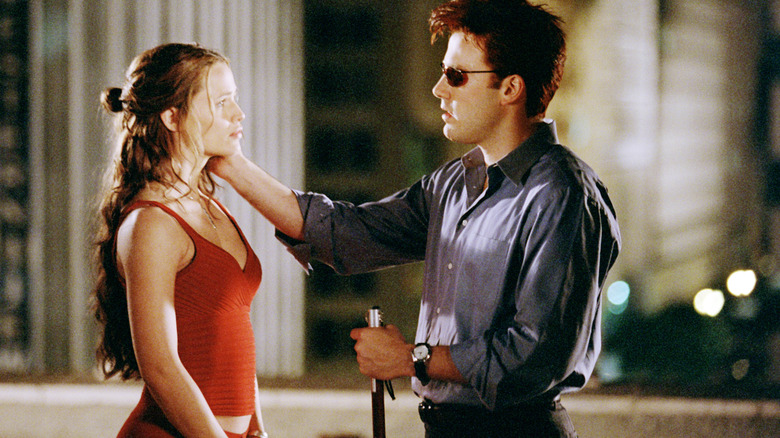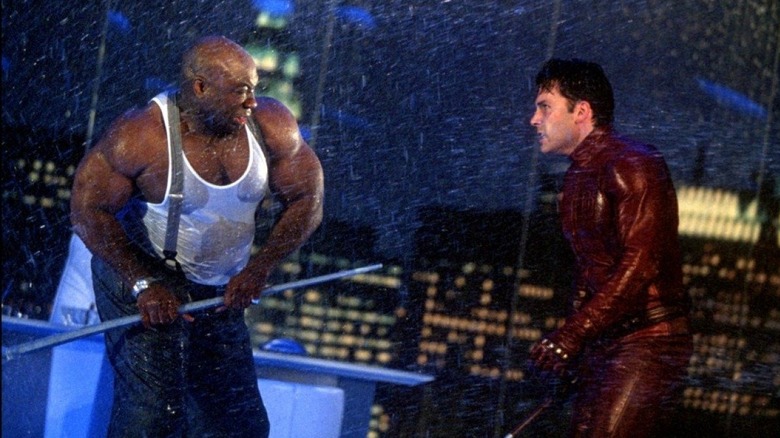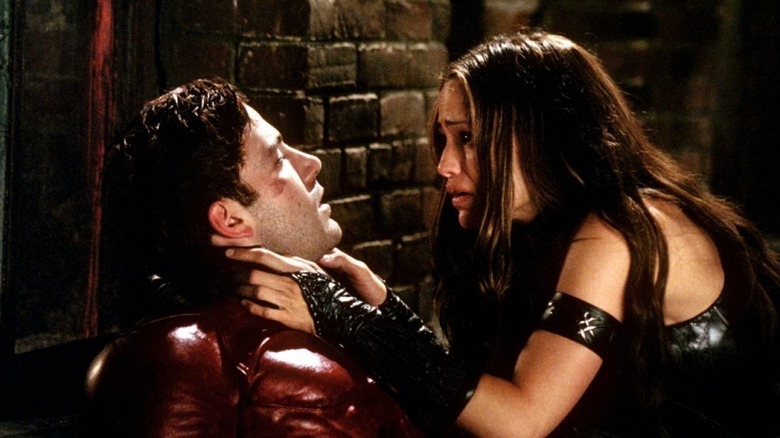How The Failure Of Ben Affleck's Daredevil Planted The Seeds For The MCU
To remind readers, outside of Batman and Superman, superhero characters were once often considered to be bad bets at the box office. Many film execs assumed that audiences were too small to make a superhero movie profitable, and the special effects needed to realize a superhero character were going to be too extensive to do cheaply. It wouldn't be until film VFX technology had sufficiently advanced that certain filmmakers would give mainstream Marvel superheroes a try. 2000 saw the release of Bryan Singer's "X-Men," a steel-glinting superhero flick that developed its own aesthetic instead of cleaving to the colorful costumes of the comic book page. 2002 saw the release of Sam Raimi's "Spider-Man," a limp and unengaging drama, but one with first-rate Spider-Man visuals that still look impressive to this day. It looked like a trend was starting.
That trend seemingly hit two speedbumps in 2003, however, with the release of two Marvel-based superhero films that were roundly rejected upon their release. One was Ang Lee's "Hulk," a psychedelic intergenerational drama that was more interested in the psychology of the Incredible Hulk than his capacity for mayhem. That film also happens to be excellent. The other film was Mark Steven Johnson's "Daredevil" starring Ben Affleck as a blind attorney who secretly possessed heightened senses of hearing and balance and who worked as a masked vigilante at night. The film was a financial success, but fans pooh-poohed the film's "edgy" 2003 visuals and hokey script.
According to the 2023 book "MCU: The Reign of Marvel Studios" by Joanna Robinson, Dave Gonzales, and Gavin Edwards, the general rejection of "Daredevil" by Marvel fans led executive producer David Maisel — a massive Marvel Comics fan — to ponder building out a whole superhero movie world. A Marvel Cinematic Universe, if you will.
For the record...
For the record, Johnson's "Daredevil" is not as bad as its reputation might have one believe. It's efficiently told, the sonar-based action is fun, and the acting is fine. The tone might be the film's most objectionable aspect as it hovers between insufferable, dated late-'90s grit and wild, comic-book whimsy. In 2003, many also disliked Affleck as an actor (just in general). Michael Clarke Duncan played the Kingpin, and Jennifer Garner played Elektra, a nascent martial arts expert vigilante who would eventually star in a (widely hated) film of her own. Colin Farrell had a wonderful time hamming it up as a near-supernatural assassin named Bullseye.
"Daredevil" made $179 million worldwide on a $78 million budget, so it wasn't a bomb. Reviews, however, were lukewarm at best — having only racked up a middling 43% approval rating on Rotten Tomatoes — and fans of the character sneered at the stylized portrayal.
Maisel was one of those fans, and his personal reaction to "Daredevil" was as sour as anyone's. Maisel was not yet a Hollywood player in 2003, and hustled every day to arrange meetings with higher-ups at Marvel Entertainment — notably Avi Arad and, later, Isaac Perlmutter — to lay out his ideas for a new financial plan. It seems, Maisel figured, that Marvel Comics wasn't getting a big enough box office share of its superhero movies. "X-Men," for instance, only paid out 5% of its B.O. total to Marvel. "Spider-Man" only paid 1%.
The plan at Marvel Entertainment was to farm out their characters to other companies, get a mere skosh of ticket sales, and keep the merchandising rights, assuring a steady, if modest, stream of revenue.
Maisel figured that having a whole cinematic stable of characters under Marvel's direct control would be better.
Who's this Iron Man fellow?
Maisel eventually landed that coveted meeting with Perlmutter at, of all places, Mar-a-Lago. At that meeting, Masiel theorized out loud that characters like Daredevil and the Hulk should be kept within the company. This would not only allow the company to keep a larger percentage of ticket sales but also set up a grander potential for crossovers. Maisel figured that it was unfair for Sony to make $200 million on a Spider-Man movie, while Marvel only pulled in about $30 million, tops.
Maisel pointed to a neglected Marvel character that Avi Arad had just licensed to New Line Cinema: Iron Man. Don't do that, Maisel said. He was quoted:
"Your character is in limbo and somebody else controls it. When you make a movie deal for a license, you're freezing animation, you're freezing a lot of other things. You're handing over your babies to somebody, and nothing happens."
In 2004, Maisel was hired as Marvel's chief operating officer, and eventually vice-chairman of the studio. Financials were re-worked, and Marvel made the move to be self-sustaining. It took several years, but, as we all know, the restructuring paid off. Marvel began to pull the film rights to its characters back from other companies (Artisan owned a few, Lionsgate owned Black Widow, Universal owned the Hulk and Namor, etc.). It was also about this time that Kevin Feige began working for Marvel, and he began floating ideas for broader storytelling throughout the all-under-one-roof Marvel characters. He, Arad, and Maisel were all essentially clamoring for more control, both creatively and financially.
"Iron Man" came out in 2008, and would eventually lay the groundwork for what was to become the Marvel Cinematic Universe. The MCU would reign supreme for the next 15 years.


